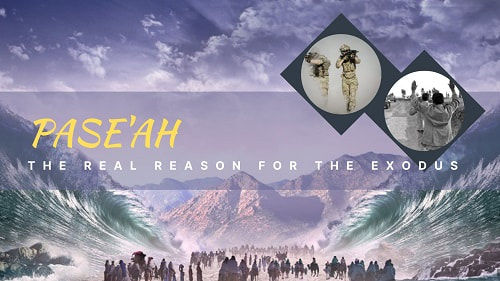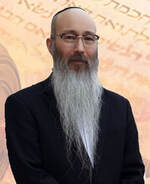|
By: HaRav Menashe Sasson Reporting from Jerusalem, Israel Published in the U.S.A. The festival of Pase’ah is a commemoration and celebration of Jewish freedom. At the Pesah seder, we read the Haggadah and discuss Jewish emancipation from slavery, which was accomplished through the exodus from Egypt. Regarding the reason HaShem took the Jews out of Egypt, there is a pasuk in the Torah which is often misquoted as saying, “I am the Lord your G-d, who brought you out of the land of Mizrayim [Egypt] to be your G-d.” The pasuk, fully and correctly quoted, actually says, “I am the Lord your G-d, who brought you out of the land of Mizrayim [Egypt] to give you the land of Kena’an [Eretz Yisra’el], and to be your G-d.” Vayyiqra 25:38. The addition of the omitted phrase in this pasuk “to give you the land of Kena’an” answers the question of why it was necessary for HaShem to take the Jews out of Egypt. After all, if HaShem simply wanted to be the G-d, of the Jews, He could have performed miracles that would have given Jews the freedom to worship Him while they continued to live in Mizrayim, or, for that matter, in New York, Chicago, Los Angeles, Miami, London, Paris, or New Delhi. The order in which HaShem informs us of the reason for the Exodus is also instructive. HaShem said He took the Jews out of Mizrayim “to give [them Eretz Yisra’el]” and “to be [their] G-d,” the implication being that there is a relationship between Eretz Yisra’el and HaShem being the G-d of the Jewish people. The Talmud addresses the issue:
Masechet Ketuvot, 110b. After giving the Jewish people the Torah at Mount Sinai, HaShem warned them against allowing the inhabitants of Eretz Yisra’el to remain in the Land after the Land had been conquered by the Jews.
Shemot 34:11-12. The command to expel from Eretz Yisra’el all inhabitants who possessed the land prior to the Jews is repeated in Sefer Bamidbar:
Or HaChaim, commentary to Bamidbar 33:52. Likewise, Abarbanel said:
Abarbanel, Commentary on Shemot 34:11-12. Why, one might ask, does HaShem emphasize expelling from Eretz Yisra’el those who claim a legal or other right to the Land? The answer is simple. Shortly before the giving of the Torah to the Jewish people at Mount Sinai, HaShem, who was speaking about the Jewish people, said, “You shall be to me a kingdom of priests and a holy nation [אתם תהיו לי ממלכת כהנים וגוי קדוש].” Shemot 19:6. The word “kadosh” [קדוש], in addition to meaning “holy” also means “separate,” which suggests that HaShem intends for the Jewish people to be physically, as well as spiritually, separate from the other peoples of the world. Applying this Torah commandment to contemporary times, we see that the State of Israel must limit Israeli citizenship and rights of residency to those who are Halakhically Jewish, as well as create incentives for non-Jewish residents of Israel who claim a right to possession of Eretz Yisra’el to relocate to other lands, because, among other reasons, these individuals will always “be a snare among” the Jewish people. One might argue, however, that Israel is a democracy and that a democratic country may not exclude people based on race. There are several answers to this question. The first is that denying citizenship to non-Jews and incentivizing certain non-Jews to relocate to other lands does not constitute discrimination based on race. When addressing the issue of racial discrimination, it is important to understand that, “race,” by definition, reflects a physical characteristic or trait which is immutable, that is, a characteristic or trait which cannot be changed. Notwithstanding that the majority of persons who are Halakhically Jewish are persons who were born to a Halakhically Jewish mother (“Born Jew”), there are also many Jews who, in accordance with traditional rules of Halakha, converted to Judaism (“Naturalized Jews”). In other words, just like the citizens of many other nations, there are citizens of the Jewish nation who are Born Jews and there are citizens of the Jewish nation who are Naturalized Jews, that is, Jews who “immigrated” and joined – that is, became citizens of – the Jewish nation. The fact that a person may become Jewish through a halachically valid conversion conclusively demonstrates that “Jewishness” is a mutable characteristic or trait which can be acquired, as opposed to an immutable characteristic or trait which cannot be altered or acquired. Therefore, to discriminate against someone because they are not Jewish is not a form of discrimination which is based on race. A fortiori, laws which distinguish between Jews and non-Jews are not laws which discriminate based on race. To this, one might respond – correctly – that although laws which distinguish between Jews and non-Jews are not laws which discriminate based on race, such laws, nevertheless, discriminate based on religion. To the Western (and largely, the Christian) mind, it is unacceptable to discriminate against someone because of his religion. This, however, is not a Torah concept, nor is it a concept that is accepted by many non-Western countries. For example, Saudi Arabia, which is widely considered to be a “moderate” Muslim country, has, for a very long time, forbidden Jews even to enter its country, much less reside there. Other countries that, for many, many years, have systematically discriminated against Jews include: Aden, Algeria, Egypt, Iraq, Lebanon, Libya, Morocco, Syria, Tunisia, and Yemen. More importantly, however, the State of Israel, in addition to claiming to be a democracy, also claims to be a Jewish State, in fact, the only Jewish state in the world. As such, it is inconceivable that the State of Israel should allow non-Jews to live in Israel or to grant them political rights which will allow them – peaceably – through natural population growth, to become a majority of the population which, in turn, would allow them to use Israel’s supposedly democratic political system to, for example, change the name of Israel to “Palestine” and to then change Israel from a Jewish state to an Arab or Muslim state. The complaint of Arabs who reside in Israel is not that the State of Israel treats them poorly. Indeed, there is virtually no immigration of Arabs from Israel to other countries. Rather, the complaint of Arabs who reside in Israel is, simply, that the State of Israel exists. The Arab who resides in Israel genuinely, although erroneously, believes that the Land of Israel was stolen from him. Thus, from his perspective, the only satisfactory outcome is for the State of Israel to cease to exist. Hatikvah [התקוה], the Israeli national anthem, reads in part, “As long as in the heart, within [כל עוד בלבב פנימה], The soul of a Jew still yearns [נפש יהודי הומיה], [for] The land of Zion and Jerusalem [ארץ ציון וירושלים]. This is hardly a song, or a sentiment, which is likely to arouse or awaken much patriotism in a non-Jew who happens to reside in Israel. May the Jewish people understand, accept, and pray for the timeless freedom that was envisioned by HaShem when He took us out of Egypt so many years ago, and may the Jewish citizens of the State of Israel exercise their freedom to vote for Jewish politicians that will transform the State of Israel into a state which is truly Jewish, rather than the current state which is Jewish in name only. Next Year in Jerusalem [בשנה הבאה בירושלים]! !שבת שלום & חג שמח Shabbat Shalom & Hag Sameah! Copyright © The Israel Foundation. All Rights Reserved.
0 Comments
Your comment will be posted after it is approved.
Leave a Reply. |
THE ISRAEL FOUNDATION





